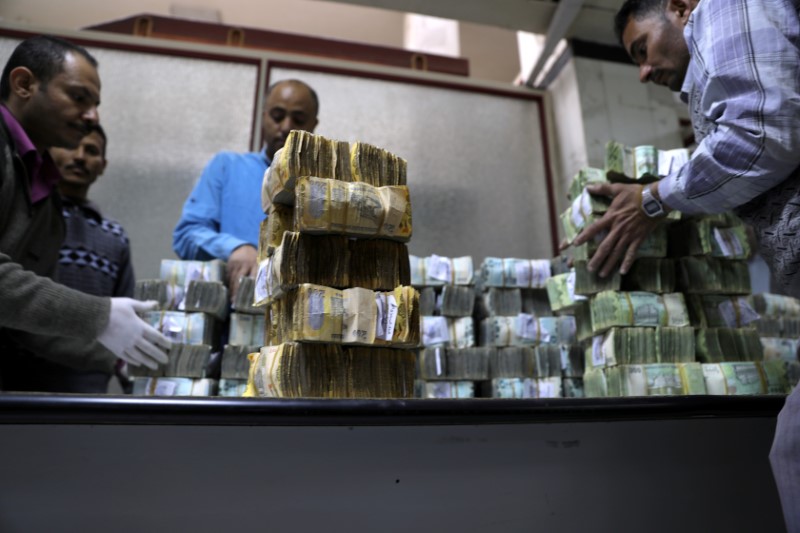SANAA/ADEN (Reuters) - Yemen's warring sides opened a new front in their five-year conflict on Saturday - a battle over old and new banknotes that threatens to create two economies in the same state.
As of midnight, the Houthi movement which controls the capital Sanaa outlawed the use and possession of crisp new Yemeni riyal bills issued by its rivals in the internationally recognized government based in the southern port town of Aden.
The Iran-allied Houthis, who say people should only use the old bills, have defended the ban as a move against inflation and what they call rampant money-printing by the government.
The government has branded the ban an act of economic vandalism. And the population, as ever, have been left stuck in the crossfire.
Yemenis from both sides told Reuters the ban had effectively created two currencies with diverging values, adding to the turmoil in a state already governed by two powers and brought to its knees by the war.
In the one-month build up to the ban, people in Houthi-controlled areas have been queuing to try to exchange their new riyal notes for old, turning the grubby and torn bills into a prized and relatively scarce commodity.
The riyal stood at about 560 to the dollar across Yemen before the ban was announced in mid-December. The rate has since slipped a little in Houthi-controlled areas to around 582, but slumped much further to 642 in the south, an area now awash with new bills.
That relative strength might look like a boon for northerners, if only they could get hold of enough of the old notes in time to keep afloat in the largely cash-based economy.
"We go for the exchange and they won't take [the new notes] from us. Or say they need three, four or five days," craftsman Abdullah Saleh al-Dahmasi told Reuters on a Sanaa street a week before the ban came into force.
"The new one isn't accepted and the old one is worn out, they have to find a solution," the 27-year-old said.
A few days before the ban came in, around 20 angry men and women were turned away from one exchange which said it had filled its quota for the day. Many had been coming there for three days in the hope of swapping their cash.
North-south trade has become far more expensive as traders have to buy and sell two types of riyal - told apart by the state of the paper and the different sizes and designs.
TWO CENTRAL BANKS
Many people in Sanaa told Reuters they felt the ban was needed to constrain inflation. But they were facing difficulties in the short-term.
"When people saw that new currency come into circulation, they held onto it as it was new and shiny. But now it's a problem that they have it," said 28-year-old Abdallah Bashiri, a private sector worker in Sanaa.
In that city, legal exchanges will swap 100,000 Yemeni riyals (around $172) in new notes for electronic currency that can be spent on things like phone credit or electricity bills, for a small fee of around $1.50.
But things get more challenging when it comes to actual paper that can be spent in food markets. Sanaa residents said unofficial exchanges are offering to change 100,000 riyals of new notes into 90-96,000 riyals of the scarcer old.
After the Houthis stormed the capital Sanaa in 2014 and ousted the government of President Abd Rabbu Mansour Hadi, Yemen's central bank split into two branches - one in Sanaa, under Houthi control, and one internationally recognized branch in Aden, which has access to money printers.
The Aden authorities have defended their decision to step up the printing of new money from 2017, saying it was an attempt to deal with a building cash crunch and pay public sector salaries.
"The Houthis ... did not consider the economic cost to society," Yousef Saeed Ahmad, adviser to the governor of Aden's central bank, told Reuters there this week.
"We hope the measures taken are short-term. They cannot be kept up because the economy is one, it is interrelated and commodities flow from Sanaa to Aden and vice versa. This measure will aggregate the living conditions of all Yemenis," he said.
The crackdown on new banknotes means many public sector workers in Houthi areas have stopped receiving salaries from the Aden government. The resumption of these salary payments across conflict lines had been a key bipartisan step to alleviate Yemen's humanitarian crisis.
The Houthis have defended their ban as a way of defending the value of the currency.
"The Sanaa central bank had to take measures to stem the dangerous practices the Aden central bank was carrying out through their monetary policy," said Sami al-Siyaghi, in charge of foreign banking operations at the Sanaa central bank.

"The imposition of [Aden's] monetary stance on us led to the collapse of the national currency against foreign currency ... With each new issuance you notice a commensurate collapse in the riyal against foreign currency," Siyashi told Reuters.